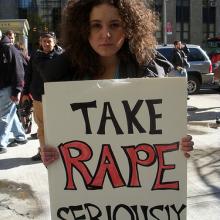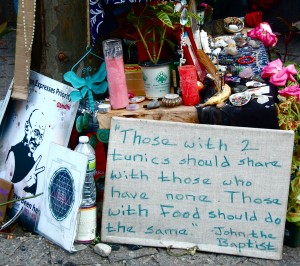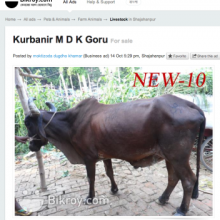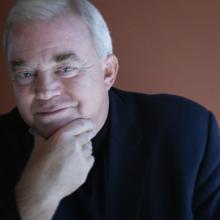vulnerable
If confirmed, Pruitt should walk into the halls of the Environmental Protection Agency with the same conviction of faith with which he walks into First Baptist Church of the Broken Arrow. He should promote policies to guard clean water and clean air, to protect children from pollution, and to safeguard all of us from the impacts of a changing climate.
“When we were children, we used to think that when we were grown-up we would no longer be vulnerable. But to grow up is to accept vulnerability … To be alive is to be vulnerable.”
These are the words of Madeleine L’Engle, and this week I’ve been reminded of the wisdom they contain.
This weekend, Christianity Today posted an excerpt from my new book, Jesus is Better Than You Imagined, in which I share a story about childhood sexual abuse and my adult struggle to understand my sexuality. Many have asked why I would do such a thing.
This wasn’t a career move or a brazen attempt to sell more books. Being open about these experiences as an evangelical writer leaves me, like so many scarecrows, exposed. I do not plan to become a spokesman for any of the issues addressed in this article. The events shared are a part of my story, but they are not the whole of my calling. Today, I return to my job as a columnist committed to exploring the interface between faith and culture and helping foster difficult conversations that others may be unwilling to have.
After serving as vice president of the U.S. Conference of Catholic Bishops for the past three years, there was little surprise when Archbishop Joseph Kurtz of Louisville, Ky., was elected this week to the top post in the American hierarchy.
Yet the nearly 250 churchmen would have been hard-pressed to find a better president to help them pivot toward the new, more pastoral path set out in recent months by Pope Francis.
Kurtz has earned his stripes with the hierarchy’s conservative wing thanks to his past work heading their campaign against gay marriage, but he was also molded by his early years as a pastor and his work in social justice — experiences he mentioned early and often when facing reporters after his election on Tuesday.
Muslims in Pakistan, Bangladesh, and elsewhere went online to buy live cows and goats for the traditional Islamic Feast of Sacrifice, known as Eid al-Adha, because shopping on the Internet was easier than going to crowded street markets to buy the animals.
“The purchase of sacrificial animal [online] has gained popularity as it is found to be the most convenient way of buying an animal for the ceremonious day,” Pakistan’s The Nation newspaper reported Wednesday.
Thursday marked the tenth day of the government shutdown and the second of the #FaithfulFilibuster — A Vigil for the Poor. People of faith, both across the street from the Capitol Building and across the world on social media, are reading through the more than 2,000 Bible verses that deal with poverty and justice as a witness for those the shutdown is affecting the most.
The rain didn't deter the prayers, as leaders from Sojourners, Bread for the World, the National Association of Evangelicals, the Salvation Army, and more gathered once again to call on Congress to end the shutdown and stop hurting the poor.
They are asking people of faith to reach out to Congressional leadership. Join along with them to Tweet at those members of Congress with your message to them and hashtag #FaithfulFilibuster.
A lot of ink, pixels, and air have been used on the potential effects of the so-called “fiscal cliff.” While many experts say that “cliff” is a misnomer (it’s more of long slope in the wrong direction), there is at least broad agreement that it’s not the right direction for the country’s long-term health.
We’ve heard a lot about the potential effects on Wall Street, our nation’s credit rating, and even the military. But little has been said about the devastating consequences for our nation and the world’s poorest and most vulnerable people — or for the charities and non-profits that serve them.
This week, the Circle of Protection, released an open letter to the president and Congress with a simple message: during the holidays, please “advance policies that protect the poor — not ones that make them poorer.”
Editor's Note: The following remarks were given on Capitol Hill on Aug. 1 as part of a call from faith leaders across the religious spectrum urging Congress to extend the Earned Income Tax Credit and Child Tax Credit for low- and moderate-income Americans.
A budget is a moral document. That phrase was coined by the faith community and has become a refrain in the ongoing debates over deficits and budgets. But in this week’s House vote on extending the Bush era tax cuts, we see one more example of the priorities and principles of the broader GOP budget and how they apply to the rich and to the poor. Because of this, we must conclude that the Republican budget is an immoral document—in the way it treats the poor. I certainly don’t believe that all our Republican lawmakers came to Washington to hurt poor people, but it’s time for some of them to challenge the dominant forces in their party and face the consequences of such indefensible choices.
We have a genuine hope for a long term bi-partisan solution and, in particular, a moral non-partisan commitment to protect the poor and vulnerable from being expendable in these fiscal debates. We should also say that Democratic budgets have not been models of fiscal responsibility and social justice, either. But what the House budget is calling for is morally objectionable on religious and biblical grounds—and people of faith from all political stripes should say so. In particular, to roll back tax credits for the poor to help fund tax breaks for the rich is morally reprehensible, and the faith community has to speak out.

Protester holding placard, 2010. Image via Wylio. http://bit.ly/rXM1Om
Earlier this week, the Burlington Free Press broke the story about the circulation of a provocative online survey among members of Sigma Phi Epsilon — the largest fraternity at the University of Vermont — which included the question: "If I could rape someone, who would it be?"
On the questionnaire, fraternity members were asked to respond to questions ranging from the benign (“Who’s my favorite artist?”) to the debauched (“Where in public would I want to have sex?”) But it was “Personal Question #3” — the hypothetical rape question — that drove the university to put the fraternity on suspension.
The University of Vermont’s chapter is under investigation by Sigma Phi Epsilon's national office. Women’s and other human rights groups in the Burlington area circulated petitions, gathered for protests on campus, and have called on the university to terminate the fraternity once and for all.
This isn't the first time the men of University of Vermont’s Sigma Phi Epsilon aka “SigEp” – a fraternity founded on the principals of “Virtue, Diligence, and Brotherly Love” – have gotten themselves in trouble. A few years ago, SigEp’s national office temporarily revoked the school’s charter, stating that the house’s hazing rituals and other risky behaviors made the organization vulnerable to lawsuits.
It’s impossible to ignore the significance of the most recent SigEp transgression in light of a very different survey released by the Centers for Disease Control and Prevention (CDC) the day after the Vermont story broke.
The CDC study found that nearly 1 in 5 American women have been raped.
It’s worth remembering that in 1986, 25 years ago, the bishops at their annual meeting approved a pastoral letter on the economy, “Economic Justice for All.” It was, and still is, a powerful statement of Catholic social teaching on the “important social and moral questions for each of us and for society as a whole” that are raised by our economic life. It’s a letter that the entire church, Catholic or not, should read and affirm.
In an opening section, “Why we write,” the bishops ground their letter: “The life and words of Jesus and the teaching of [God's] Church call us to serve those in need and to work actively for social and economic justice. As a community of believers, we know that our faith is tested by the quality of justice among us, that we can best measure our life together by how the poor and the vulnerable are treated.”
In Mathew 25, he allows no excuses, personal or institutional.
“As you have done it to the least of these, you have done it to me,” Jesus says without qualification. Apply that text to this terrible exploitation at Penn State and it certainly speaks explicitly to the most vulnerable children who have been so horribly abused there.
As it was done to them, it was done to Christ himself, the very Son of God. This famous text is one of the few passages of judgment in the New Testament.
Judgment is now needed at Penn State and beyond about how we continue to allow wealth, power, institutional protections, and cultural complicity to aid, abet, and enable the evil abuse of our most vulnerable children.
 One of the constant threads in scripture is, "Give us this day our daily bread." Nothing more, nothing less. Underneath this admonition is the assumption that the more we store up for tomorrow the less people will have for today. And in a world where 1 percent of the world owns half the world's stuff, we are beginning to realize that there is enough for everyone's need, but there is not enough for everyone's greed. Lots of folks are beginning to say, "Maybe God has a different dream for the world than the Wall Street dream."
One of the constant threads in scripture is, "Give us this day our daily bread." Nothing more, nothing less. Underneath this admonition is the assumption that the more we store up for tomorrow the less people will have for today. And in a world where 1 percent of the world owns half the world's stuff, we are beginning to realize that there is enough for everyone's need, but there is not enough for everyone's greed. Lots of folks are beginning to say, "Maybe God has a different dream for the world than the Wall Street dream."
Maybe God's dream is for us to live simply so that others may simply live. Maybe God's dream is for the bankers to empty their banks and barns so folks have enough food for today.
As you are reading this, the Congressional Joint Select Committee on Deficit Reduction (a.k.a. The Super Committee) is making choices about who and what our nation will protect.
Will we protect the wealthiest 2 percent by preserving $690 billion in Bush era tax cuts?
Or will we protect children by preserving $650 billion in special education, student aid, and assistance to low-income schools?
Will we protect corporations by preserving $97.5 billion in subsidies for big business or will we protect families by preserving $98 billion in Head Start and child care programs?
We have 32 days left to remind Congress that, "Oppressing the poor in order to enrich oneself, and giving to the rich, will lead only to loss" (Proverbs 22:16).








